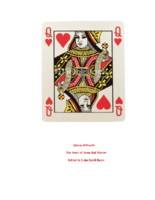Search the Special Collections and Archives Portal
Search Results

Interview with Charles Costa, February 13, 2009
Date
Archival Collection
Description
Text
Elizabeth von Till and Claude N. Warren Professional Papers
Identifier
Abstract
The Elizabeth von Till and Claude N. Warren Professional Papers (1916-2021) are comprised of the personal and professional papers of anthropologist Claude N. Warren and historical preservationist Elizabth von Till Warren. The materials in this collection primarily consist of research files, maps, and drawings on various archaeological and historical preservation projects in southern Nevada of which they both were involved. This collection includes field notes and surveys from archaeological projects such as the Old Las Vegas Mormon Fort and the Las Vegas Springs Preserve. Records on von Till Warren's involvement with the Old Spanish Trail Association, Southern Nevada Historical Society, and historic preservation work around southern Nevada are represented. Also included are Robert H. Crabtree's archaeological research files, a colleague of Claude Warren who bequeathed his professional files to him upon his death.
Archival Collection

Nevada Women's History Project bylaws, policies, and procedures
Date
Archival Collection
Description
Folder from the Nevada Women's History Project Records (MS-00406).
Text

Transcript of interview with Paul Senzaki, Alan Hess, and Charlie White III by Stefani Evans and Claytee White, September 9, 2016
Date
Archival Collection
Description
Architect Paul Senzaki, and artist-illustrator Charlie White III recall their experiences of working in Las Vegas: Paul on Treasure Island, The Palms, Fremont Street Experience, and World Market Center and Charlie on Treasure Island and its successor, TI; New York New York. Architectural historian Alan Hess, who is an expert on Las Vegas architecture, offers historical context and asks pertinent questions. While this interview touches on several iconic Las Vegas buildings, the conversation mostly details why and how Steve Wynn's Treasure Island involved the labors of artists, illustrators, art directors, and designers of stage and screen as well as the those of architects, contractors, planners, and subcontractors.
Text

Transcript of interview with Anna Sipl Meyers by Leita Kaldi Davis, February 12, 2012, February 29, 2012, March 27, 2012, April 6, 2012, April 24, 2012, May 3, 2012, May 9, 2012, May 16, 2012, October 19, 2012, November 16, 2012, & December 7, 2012
Date
Archival Collection
Description
From concentration to ownership of Las Vegas casinos, Meyers owned the Cashbah and the and Queen of Hearts in downtown Las Vegas. Interview dates: 2/12/2012, 2/29/2012, 3/27/2012, 4/16/2012, 4/24/2012, 5/3/2012, 5/9/2012, 5/16/2012, 10/19/2012, 11/16/2012, 12/7/2012.
Text

Transcript of interview with Tony Scodwell by Lisa Gioia-Acres, September 29, 2008
Date
Archival Collection
Description
Tony was born the only son of the only son in Beloit, Wisconsin. Following his parents divorce when he was 12, he and his father went to live with his grandparents who, he admits, spoiled him. While neither of his parents played a musical instrument, Tony’s grandmother was a professional organist. In addition, Tony had an uncle who was a professional saxophone player and who was an inspiration to him. Tony’s dad was very supportive of his decision to learn trumpet and rented Tony an instrument, took him to his lessens, and sat with him while he practiced. Tony was firm in his convictions by the 9th grade that he was going to be a musician. Following high school, Tony was awarded a full scholarship to the Berklee School of Music in Boston which was a very prestigious music school. Tony repeatedly left school to go on the road which the school fully expected of their students. The last time he left the school he never went back. Tony states he got his degree on the road with experience from playing in bands like Stan Kenton, Tommy Dorsey, and with his idol Harry James. Tony took his career abroad when he took up residence in Cologne, Germany to play with a band there. Tony came to Las Vegas to play in a band with Buddy Rich which turned out to be of a shorter duration than he expected. Tony then played in Las Vegas and Reno for a time before going back on the road after realizing he preferred playing jazz on the road as opposed to playing in show bands. After eight years on the road, Tony returned to Las Vegas, got married, and settled down. Aptitude tests proved accurate when they showed Tony had a talent for things mechanical and metal as Tony went on to manufacture trumpets in addition to playing them. One can feel the love Tony has for his trumpets as he describes the process of creating them. After playing trumpet for almost 30 years, Tony decided it was time to concentrate on his photography for a while. Tony does not consider himself retired, but rather he likes to play, take pictures, and, of course, he practices the trumpet every day.
Text

Nora Mirabal interview, August 30, 2019: transcript
Date
Archival Collection
Description
Interviewed by Elsa Lopez and Barbara Tabach. Cuban refugee family by way of Spain and then to the US; arrived in Las Vegas in 1973 when Nora was 9 years old. Struggled in youth but rises up as embraces educaton. Currently is Assistant Director of Academic Partnership at CSN.
Text

Ace Daniels interview, June 2019: transcript
Date
Archival Collection
Description
Interviewed by Monserrath Hernández and Rodrigo Vazquez. Born (1985) and raised in Nevada, Ace is the Senior Conference Sales Manager at Wynn and Encore. His parents immigrated from Dominican Republic and are casino dealers. Ace is a UNLV graduate with degrees in Business and in Theatre Arts. Enthusiastic support of local theatre arts, he is active with the Super Summer Theatre Advisory Board. Married to Raul Daniels.
Text

Abraham Gomez interview, December 6, 2019: transcript
Date
Archival Collection
Description
Interviewed by Elsa Lopez. Abraham Gomez is a College Navigator for the Nevada Treasurer's Office where he is responsible for providing and distributing information on post-secondary resources that may enable Nevadans to go to college. Gomez was born and raised in Las Vegas, Nevada and grew up on the East Side near Desert Pines High School. He received an Associate of Arts from the College of Southern Nevada before obtaining a bachelor's degree in Communication Studies from the University of Nevada, Reno. After graduating he worked as a GEAR UP Ambassador for Nevada State College where he advised a cohort of 46 low-income students on the importance of continuing their education. He has volunteered with various organizations throughout Southern Nevada and continues to work to better his community and make education accessible to students everywhere.
Text

Transcript of interview with Dr. Fiona Kelley by Lisa Gioia-Acres, March 21, 2009
Date
Archival Collection
Description
Dr. Fiona Kelley was born and raised in Connecticut. Her parents were both teachers (though her mother quit teaching to raise their two daughters), and Fiona recalls the European vacations the family took every summer, exploring castles and enjoying picnic lunches. Fiona was educated at Greenwich Academy in Connecticut and Bard College (dance major with art history minor) in New York. She mentions dancing in Acapulco and California and then auditioning and being hired as a cover dancer for Hallelujah Hollywood! at the MGM in Las Vegas. Meanwhile, she had also become licensed in massage and states that as she was making the transition from dancing to production of dance, she and her husband were invited to China. While in China, Dr. Kelley recalls visiting a hospital which specialized in the treatment of AIDS through acupuncture. This led to a decision to learn Oriental medicine, which she pursued once she returned to the United States. She shares many details of her studies
Text
